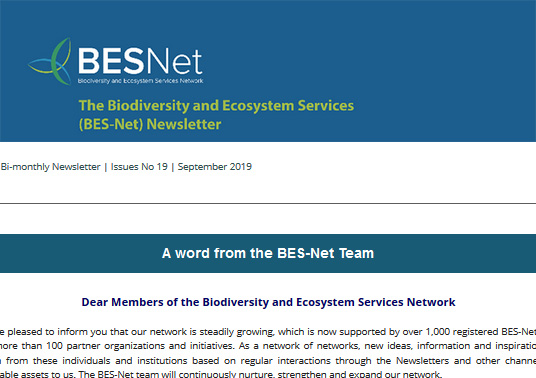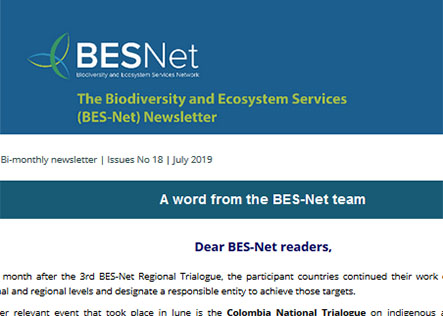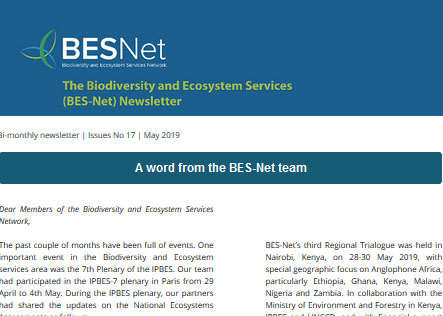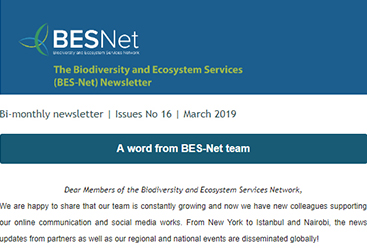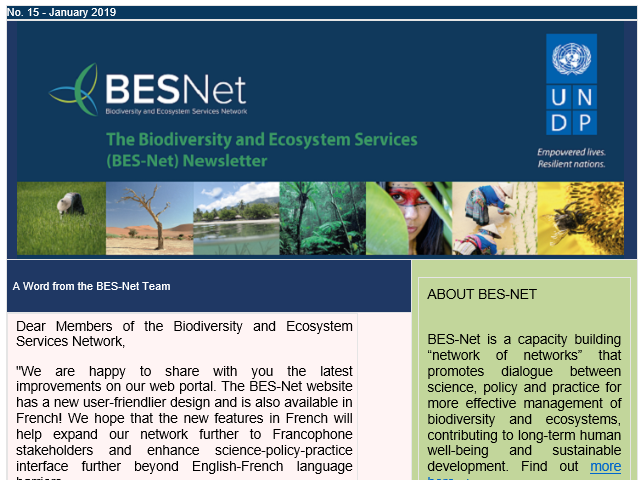Dear BES-Net Partners and Members

November marked a bustling month, particularly for those who were at Glasgow or following remotely the much anticipated UN Climate Change Conference (COP26) proceedings. The event brought with it a hard-fought compromise but also an urgent awareness of the enormous work ahead to transform the world to the next level of climate action.
As we look ahead to the next year, with CBD COP15 and UNCCD COP15, one of the many messages that resonated among all was: we need to invest in and boost local nature-based solutions for climate adaptation and mitigation. Historically, nature has held all the solutions we need. But amplifying these solutions will require concerted effort, collaboration and timely investments. Indigenous peoples and local communities have often been first-hand champions of some of these solutions.
BES-Net has begun working to implement tangible and scalable biodiversity solutions with the BES Solution Fund. The Fund will run up to 2028, and a total of 18 countries will benefit from the initiative, receiving about US$ 350,000 each. The first phase of the Fund targets seven beneficiary countries, including Kazakhstan, Kenya, Nigeria and Trinidad and Tobago, who participated in BES-Net’s Regional Trialogues in 2018 and 2019. The funds will go towards ongoing efforts to conserve pollinators and rehabilitate degraded land, building on the latest evidence generated through the IPBES assessments, as well as to strengthen collaboration among BES-focused policymakers, scientists and practitioners. In the coming months, three more countries – namely Colombia, Cameroon and Viet Nam, who have already completed or are in the process of finalizing their national ecosystem assessments – will also receive the BES Solution Fund.
Working in any of these countries and keen to join BES-Net’s coalition of partners? Please reach out to alexandra.postrigan@undp.org and prashanthi.subramaniam@undp.org!
Interested in learning more about our BES-Net partners? Take a look at our new Partner of the Month series and don’t hesitate to contact us for more information or for being connected with BES-Net partners.
With that, we wish you all a healthy and peaceful end to the year and an even more fulfilling and purpose-filled 2022!
|
|
|
Amazonia- paradise (about to be) lost?

I have never visited Amazonia but, last week, I got up close with the rainforest and its indigenous communities via the photo exhibition “Amazônia”, which is currently on show until March 2022 at the Science Museum in London (see a short video on the threats to the Amazon forest here).
For almost seven years, a renowned Brazilian photographer, Sebastião Salgado, worked with twelve different indigenous communities to create this vision (and record) of the Amazon, when the forest is approaching a crucial tipping point through deforestation and land use change.
Amazônia is part of an international tour that kicked off at the Philharmonie in Paris and goes across the United Kingdom, Italy and Brazil. You can view some of the photos and listen to an impassioned plea from Sebastião for better respect for the indigenous communities of the Amazon and the role that they play in maintaining biodiversity here; you can also join a video tour of the ongoing parallel exhibition at the National Museum of 21st Century Arts (MAXXI) here. Amazônia will also open at the Science and Industry Museum, Manchester, England, in 2022.
The photos, all black and white, are available as a 528-page coffee table book – so long as you have a strong coffee table, as it weighs in at over 4kg! These photos touch an emotional core that hit home hard – what a tragedy it will be for all if the Amazon is allowed to tip.
These views of the Amazon’s original inhabitants presented by Salgado illustrate the critical role that the Amazon forests play and contrast with and reveal the urgent need to follow through on the Glasgow Leaders’ Declaration on Forests and Land Use. Signed by more than 130 countries at COP26, the declaration captures the pledge to “work collectively to halt and reverse forest loss and land degradation by 2030” and the Forest, Agriculture and Commodity Trade Statement.
|
|
 |
Stay tuned! We’re launch our new website,
with a modern look and up-to-date information this December! |
|
|
Launch of new guidance on national ecosystem assessments
for the CBD implementation

Earlier this month, UNEP-WCMC’s NEA Initiative, in collaboration with the Sub-Global Assessment Network, launched a guidance document on “‘National Ecosystem Assessments to support implementation of the Convention on Biological Diversity (CBD)”’. The guide, developed in collaboration with the CBD and with the support of the Japan Biodiversity Fund, highlights how national ecosystem assessments can help in biodiversity planning, national reporting, technical and scientific cooperation, education and awareness and capacity development, both among national biodiversity focal points and wider stakeholders. To launch the guidance, an online webinar was hosted by the Sub-Global Assessment Network on 23 November, bringing together CBD and IPBES national focal points, researchers and practitioners.
To read the guidance document, please visit: https://www.ecosystemassessments.net/resource/cbd_nea_implementation/
|
|
|
LIFE 4 Pollinators launches its first handbook

LIFE 4 Pollinators recently launched a ”Citizen Science” handbook, which incorporates the activity manual for schools called “Students 4 Pollinators”, with field recording worksheets to involve students – and also everybody else – willing to contribute to monitoring wild pollinators and entomophilous plants. The handbook provides practical pollinator-friendly suggestions that everyone can adopt. Be aware, take care and do your part to help with wild pollinators!
|
|
Latest research from South Africa studies threats to African wild dogs and the undiscovered diversity of “Majeje” termites

As if a reduction of their living spaces is not enough, the iconic African wild dog now also has to contend with rampant blood parasites that have the potential to wipe out small populations. A recent genetic study has shown how effectively parasites are transmitted between individuals.
To read the study “Molecular confirmation of high prevalence of species of Hepatozoon infection in free-ranging African wild dogs (Lycaon pictus) in the Kruger National Park, South Africa” in detail, please click here.
…………………………………………………………………………………………………………………………………………………….
If biodiversity is one of the pillars of sustainability of the African continent and key to the survival of its population, then “Majeje” are a crucial brick without which the design would be very unstable. Majeje (or macrotermes) are fungus-growing termites known as ecosystem engineers for their role in cellulose recycling and soil conditioning. Macrotermes termites are also important as edible insects and are widely consumed throughout Africa. Accurate identification of these species is challenging because of few and unreliable morphological differences among taxonomic groups. A recent study in Limpopo, South Africa, has shown that the diversity of this group has been underestimated as vast areas of the African continent have not been surveyed using DNA-based methods. To read more, click here.
These two researches was funded through research grants, managed by the South African National Biodiversity Institute (SANBI) together with the National Research Foundation and provided by the Department of Science and Innovation under its Global Change Programme.
|
|
|
2021 Pathfinder Award recognizes inspiring innovation in nature conservation
|
|
|
The second Pathfinder Award, jointly organized by IUCN and UNDP through the PANORAMA Initiative, held its online ceremony on 15 November, nominating four winners from China, India, Madagascar and Tanzania. This award recognizes and celebrates their innovative, integrated approaches to protected and conserved area management that successfully conserve nature while making development gains related to human health, climate change mitigation and adaptation, and sustainable land management. Out of over 400 nominations, four awards of USD 10,000 each were bestowed to the four winners across the following categories: biodiversity conservation and human health, technology use, climate change and land management.
To explore the winners and read more, please visit: https://panorama.solutions/en/news/pathfinder-award-2021-winners-announced-iucn-and-undp-recognise-innovation-nature-conservation
|
|
|
Event invite: Launch of new EU Biodiversity Governance

The European Commission and the Belgian Biodiversity Platform are happy to invite you to their online event “New Policies, New Practices”, launching the new EU Biodiversity governance. This virtual event will be held on 15 December 2021, 10:00 – 12:00 CET. Come explore the new landscape and opportunities of the EU Biodiversity Strategy for 2030. A series of high-level talks will allow you to find out more about the EU Biodiversity Strategy for 2030 and the strengthening of the knowledge base for policy and decision-making through new monitoring and review mechanisms and related opportunities (research funding, science-based policy support, implementation, monitoring, governance).
For more information and the programme, please visit: https://www.biodiversity.be/5607/
|
|
|
Ecosystem-based Adaptation Tools Navigator offers a new platform with over 200 tools to build capacity
|
|
|
CAMGEW’s Ernestine Leikeki Sevidzem at COP26: Rural women are key changemakers on the ground without a seat at the decision-making table

During the Gender Day at the recently concluded COP26, Ernestine Leikeki Sevidzem, founding member of Cameroon Gender and Environment Watch (CAMGEW), delivered a powerful message on the interlinkages of climate emergency and gender inequality, highlighting the critical role of forest and rural women from the Global South as knowledge holders and actors of change to be recognised at all levels.
‘’Rural women are at the forefront of climate action. They plough the soil and take care of the farmland and the natural resources. Yet their voices are not recognised when it comes to policymaking processes, including the nationally determined contributions all over the world,’’ stated Ernestine. As 2019 Equator Prize Winner, Sevidzem was invited to Nature’s Newsroom. Her participation in COP 26 was made possible thanks to the support of Women Engage for a Common Future International.
To see the full interview, follow the link: https://www.facebook.com/watch/?v=1059686151465733&ref=sharing&_rdc=2&_rdr
|
|
DGPA launches a call to secure indigenous peoples’ rights to land and resources at COP26

Patrick Saidi Hemedi, National Coordinator of BES-Net’s partner Dynamique des Groupes des Peuples Autochtones (DGPA), a network of community-based organizations supporting indigenous peoples in protecting the Congo Basin rainforest, highlighted the critical role of indigenous peoples as protectors of biodiversity. His speech at COP26 followed the announcement of an international pledge of one billion euros in funding for the Congo Basin forest, the second-largest rainforest in the world.
While leveraging the committed funds to protect, restore and sustainably manage forests, it is also vital to engage with local communities and indigenous knowledge holders to ensure that the voices of custodians of biodiversity are heard and their rights protected.
Patrick’s participation in COP26 was covered by some local media agencies in French, including https://environews-rdc.org/article/climat/618189f0ca81d60004beb77f
|
|
|
Save the date: External review of invasive alien species thematic assessment
The second order draft of the chapters and the first order draft of the summary for policymakers of the thematic assessment of invasive alien species and their control will be open for external review from 15 December 2021 to 15 February 2022. This external review is addressed to governments, experts, scientists, decision makers, practitioners and other knowledge holders, across relevant backgrounds. For more information, please click here.
|
|
|
External review: Scoping report for the business and biodiversity thematic assessment
The IPBES secretariat has opened for external review the draft scoping report for the business and biodiversity assessment. The review is open from 2 November to 13 December 2021. To support this process, in November, IPBES organized three online dialogues and workshops, targeting IPBES national focal points, government representatives and wider stakeholders. For more information and to participate in the review, please click here.
|
|
|
The Partner of the Month series promotes and disseminates best practices, success stories and other relevant news from the Network with the overarching intention to shed light on progress in biodiversity and ecosystem services. To learn more and get involved in this initiative, please contact alexandra.postrigan@undp.org
|
|
 |
| The African Biodiversity Network (October 2021) |
|
 |
| The Sub-Global Assessment Network (November 2021) |
|
Building partnerships with indigenous peoples and local communities in disaster risk reduction
Click here to read all about it!
|
|
|
|
Webinar: Moving to accelerate investments in the blue economy
25 November 2021
The UNDP-UNEP Poverty-Environment Action for SDGs recently organized a webinar as part of its ongoing series on the theme “Moving to accelerate investments for the blue economy”. The blue economy – and what sustainable blue economy interventions look like – is still very new to many of us. The issue is how to navigate from sustainable blue economy strategies to actual action-oriented financing, sovereign as well private financing for priority investments areas. This approach should include small and medium-sized enterprises, which form the mainstay of blue economies in developing countries.
The event was kickstarted by Ambassador Peter Thomson of Fiji, who serves as the UN Secretary-General’s Special Envoy for the Oceans and is a founding co-chair of the Friends of Ocean Action, and a supporting member of the High-Level Panel for Sustainable Ocean Economy. For more information and to check out the other webinars in the series, please visit https://pea4sdgs.org/knowledge/latest-news/2021-webinar-series-62021-moving-to-accelerate-investments-in-the-blue-economy
|
|
|
Webinar: Launch of the new platform for the Biosafety-Clearing-House
29 November- 7 December 2021
The CBD will officially launch the new platform for the Biosafety Clearing House (BCH) on 29 November, with an introductory webinar planned on 7 December 2021. The new BCH platform was developed by the Secretariat in response to decisions of the Conference of the Parties serving as the meeting of the Parties to the Cartagena Protocol on Biosafety. The platform will be open to all stakeholders with the core functions of the BCH being submitting records and searching for information. These functionalities have been completely redeveloped and enhanced in the new platform. In addition, the new platform offers many new features such as a modern layout, interactive country profiles page, knowledge base and more.
|
|
Senior Programme Management Officer, P5
Organization: UNEP
Location: Athens, Greece
Closing date: 3 December 2021
See here.
Corporate Partnerships Officer
Organization: Soil Association
Location: Bristol, United Kingdom
Closing date: 5 December 2021
See here. |
|
|
|
